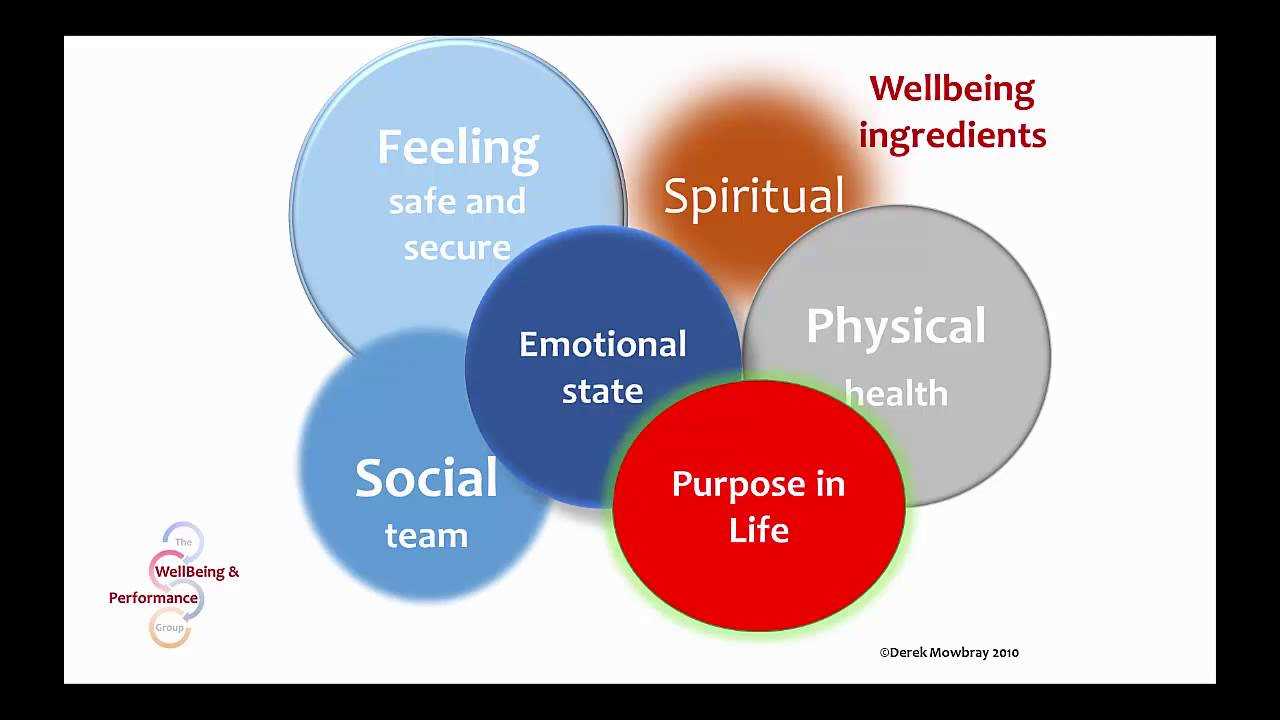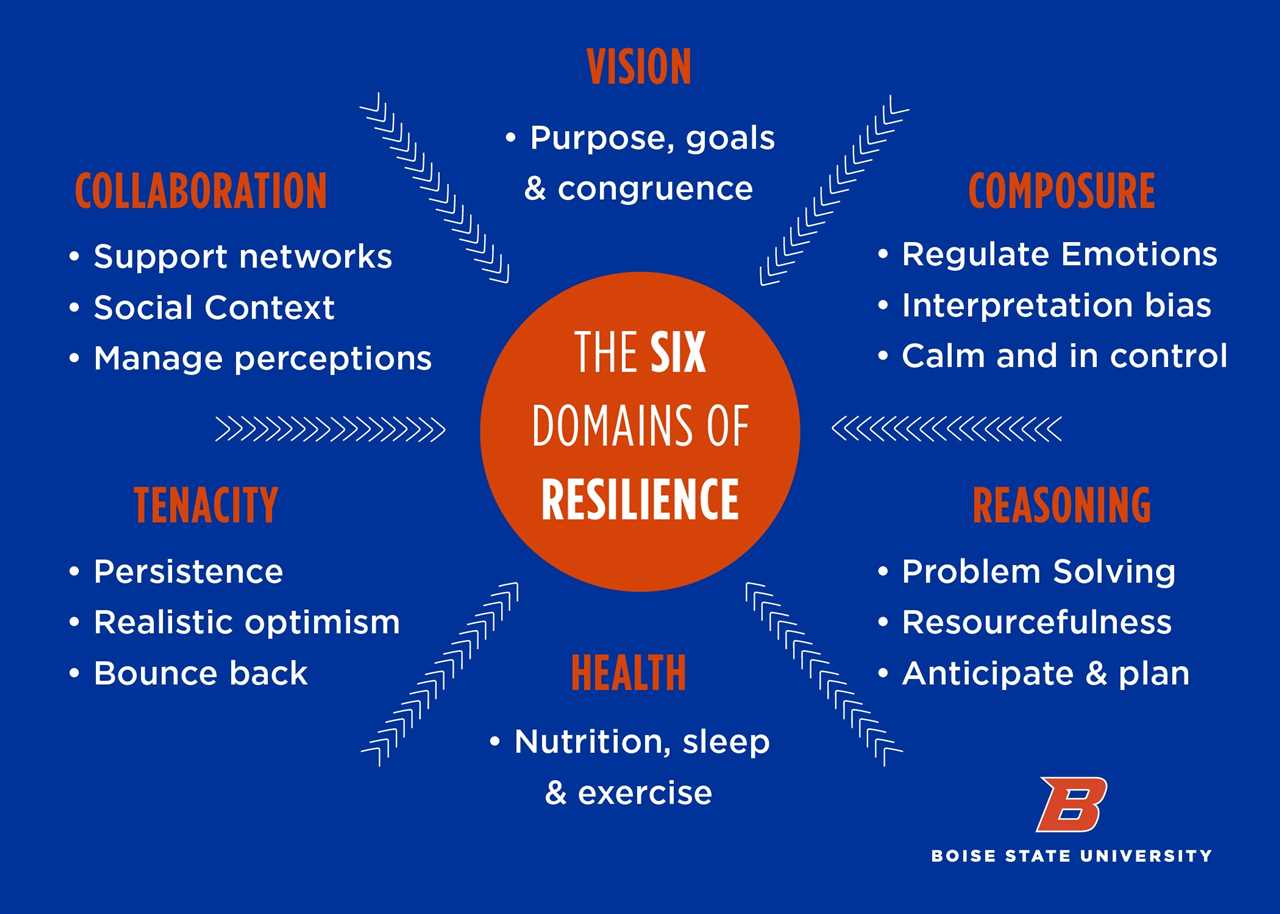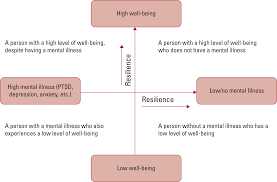
In today’s fast-paced and demanding world, stress has become an inevitable part of our lives. From work pressures to personal challenges, we often find ourselves overwhelmed and struggling to cope with the demands placed upon us. This is where resilience comes into play, offering us the ability to bounce back and thrive in the face of adversity.
Resilience can be defined as the capacity to adapt and recover from stress, adversity, or trauma. It encompasses a range of qualities, including emotional intelligence, coping skills, flexibility, endurance, mental toughness, adaptability, and resourcefulness. It is not about avoiding stress or challenges, but rather about developing the skills and mindset to navigate through them successfully.
Emotional intelligence plays a crucial role in resilience, as it involves the ability to recognize and manage our own emotions, as well as understand and empathize with others. By being aware of our emotions and how they impact our thoughts and behavior, we can better regulate our responses to stressful situations. This self-awareness and self-control are key components of resilience.
Defining Resilience and Its Importance
Resilience can be defined as the ability to bounce back from difficult or challenging situations. It is the capacity to endure and cope with stress, adversity, and setbacks. Resilience is not about avoiding or eliminating stress, but rather about developing the necessary skills and resources to navigate through it successfully.
Resilience is characterized by several key traits, including resourcefulness, emotional intelligence, adaptability, and flexibility. Resourcefulness refers to the ability to find creative solutions and leverage available resources to overcome obstacles. Emotional intelligence involves being aware of and managing one’s own emotions as well as understanding and empathizing with others. Adaptability and flexibility are essential for adjusting to changing circumstances and finding new ways to approach challenges.
Resilience plays a crucial role in maintaining mental and physical well-being. It allows individuals to effectively manage stress and prevent it from negatively impacting their health. Resilient individuals are better equipped to handle the demands of everyday life, as well as major life events such as loss, trauma, or significant changes.
Furthermore, resilience fosters a positive outlook and helps individuals maintain a sense of hope and optimism even in the face of adversity. It enables people to bounce back stronger and more resilient than before, learning from past experiences and using them as stepping stones for personal growth.
Building resilience requires practice and intentional effort. It involves developing coping skills, cultivating social support networks, and engaging in self-care activities. By actively working on building resilience, individuals can enhance their ability to navigate stress and adversity, leading to improved overall health and well-being.
What is Resilience?

Resilience is the ability to bounce back and recover from difficult experiences or stressful situations. It is the capacity to adapt and overcome challenges, setbacks, and adversity. Resilience is not about avoiding stress or living a stress-free life, but rather about having the emotional intelligence, endurance, resourcefulness, adaptability, flexibility, and tolerance to effectively cope with stress and bounce back stronger.
Resilience is often seen as a form of mental toughness, as it involves the ability to stay strong and positive in the face of adversity. It is about having the inner strength and mindset to persevere and keep moving forward, even when faced with obstacles and setbacks.
Resilience is not a fixed trait, but rather a skill that can be developed and strengthened over time. It requires practice and effort to cultivate resilience, just like building physical strength or learning a new skill. Resilient individuals are able to learn from their experiences, adapt to changing circumstances, and find constructive ways to cope with stress and adversity.
In summary, resilience is the ability to bounce back from difficult experiences, adapt to challenges, and stay strong in the face of adversity. It involves emotional intelligence, endurance, resourcefulness, adaptability, flexibility, tolerance, and mental toughness. Developing resilience is essential for maintaining good mental health and effectively dealing with stress.
The Significance of Resilience in Stress Management
Resilience plays a vital role in managing stress and is considered a key component of overall well-being. It refers to the ability to bounce back from adversity, challenges, and setbacks, and to maintain a sense of balance and stability in the face of stressors.
Endurance is a crucial aspect of resilience, as it allows individuals to withstand prolonged periods of stress without succumbing to its negative effects. Flexibility enables individuals to adapt to changing circumstances and find alternative solutions when faced with obstacles. Tolerance involves accepting and coping with stressors without becoming overwhelmed or disheartened.
Resourcefulness is another important trait associated with resilience. It involves the ability to effectively utilize available resources, both internal and external, to manage stress and find solutions. Mental toughness is closely related to resilience and refers to the ability to stay focused, motivated, and resilient in the face of adversity.
Emotional intelligence, which encompasses self-awareness, self-regulation, empathy, and social skills, is also closely linked to resilience. It allows individuals to understand and manage their emotions in a healthy and constructive manner, which can help mitigate the negative impact of stress.
Adaptability is a key characteristic of resilient individuals. It involves being open to change and being able to adjust one’s mindset and behaviors to effectively deal with stressors. Resilient individuals are able to embrace new challenges and find innovative solutions.
In conclusion, resilience is highly significant in stress management. It encompasses endurance, flexibility, tolerance, resourcefulness, mental toughness, emotional intelligence, and adaptability. Developing and nurturing these traits can greatly enhance an individual’s ability to cope with stress and maintain overall well-being.
The Link between Resilience and Health
Resilience plays a crucial role in maintaining and promoting overall health and well-being. It is the ability to bounce back from adversity and cope with life’s challenges. Emotional intelligence, adaptability, coping strategies, endurance, resourcefulness, flexibility, and mental toughness are all key components of resilience.
Individuals with high levels of resilience are better equipped to handle stress and are less likely to experience negative health outcomes. They have the ability to effectively manage their emotions and adapt to changing circumstances. This allows them to maintain a positive outlook and find constructive ways to deal with stressors.
Resilience is closely linked to mental health. People who are resilient are more likely to have good mental health and lower rates of mental illness. They are better able to cope with trauma, loss, and other challenging life events. Resilience also plays a role in preventing the development of mental health disorders such as anxiety and depression.
In addition to its impact on mental health, resilience also has a positive effect on physical health. Research has shown that individuals with higher levels of resilience have better immune system functioning, lower rates of chronic diseases, and faster recovery from illness or injury. This may be due to their ability to effectively manage stress, maintain healthy lifestyle habits, and seek support when needed.
Building resilience is a lifelong process that involves developing and strengthening the skills and qualities associated with it. This can be done through various strategies such as practicing self-care, cultivating strong social connections, seeking professional help when needed, and engaging in activities that promote personal growth and well-being.
In conclusion, resilience is a critical factor in maintaining and improving overall health. It encompasses emotional intelligence, adaptability, coping strategies, endurance, resourcefulness, flexibility, and mental toughness. By developing and nurturing resilience, individuals can better manage stress, promote mental well-being, and enhance their physical health.
Factors Influencing Resilience
Resilience is influenced by a variety of factors that contribute to an individual’s ability to cope with stress and adversity. These factors include:
1. Resourcefulness: The ability to effectively utilize available resources and support systems can greatly enhance resilience. Individuals who are resourceful are more likely to seek out and take advantage of the help and assistance that is available to them.
2. Mental Toughness: Mental toughness is the ability to stay focused, motivated, and determined in the face of challenges. Individuals with high levels of mental toughness are better able to maintain a positive mindset and persevere through difficult times.
3. Flexibility and Adaptability: Resilient individuals are able to adapt to changing circumstances and are flexible in their thinking and approach. They are able to adjust their strategies and behaviors as needed in order to effectively navigate challenges and setbacks.
4. Emotional Intelligence: Emotional intelligence refers to the ability to recognize, understand, and manage one’s own emotions as well as the emotions of others. Individuals with high emotional intelligence are better able to regulate their emotions and cope with stress in a healthy and productive manner.
5. Tolerance for Uncertainty: Resilient individuals are able to tolerate uncertainty and ambiguity. They are comfortable with not having all the answers and are able to maintain a sense of calm and stability in the face of unknown outcomes.
In conclusion, resilience is influenced by a combination of factors including resourcefulness, resilience, coping, mental toughness, flexibility, adaptability, emotional intelligence, and tolerance for uncertainty. These factors can be cultivated and developed through various strategies and interventions, ultimately leading to improved resilience and better overall mental health.
Genetic and Biological Factors

Resilience, the ability to bounce back from adversity, is influenced by a combination of genetic and biological factors. Research has shown that certain genetic variations can make individuals more or less resilient to stress. These variations can affect the way our bodies respond to stress, including the release of stress hormones and the activation of the immune system.
Adaptability, emotional intelligence, endurance, and mental toughness are all traits that can be influenced by our genetic makeup. Some individuals may have a naturally higher level of resilience due to their genetic predisposition. These individuals may be more able to cope with stress and bounce back quickly from challenging situations.
Biological factors, such as brain structure and function, also play a role in resilience. The brain is a highly complex organ that is responsible for processing and responding to stress. Individuals with certain brain characteristics, such as increased connectivity between regions involved in emotion regulation and cognitive control, may have a greater ability to regulate their emotions and cope with stress.
Furthermore, the body’s stress response system, including the hypothalamic-pituitary-adrenal (HPA) axis, plays a crucial role in resilience. The HPA axis is responsible for releasing stress hormones, such as cortisol, in response to stress. Individuals with a more efficient stress response system may be better equipped to handle stressful situations and recover more quickly.
In addition to genetic and biological factors, other personal characteristics, such as coping strategies, resourcefulness, and tolerance for uncertainty, can also influence an individual’s level of resilience. These factors can be learned and developed over time, and individuals can improve their resilience through various techniques, such as therapy, mindfulness practices, and self-reflection.
In summary, resilience is influenced by a combination of genetic and biological factors, as well as personal characteristics and coping strategies. Understanding these factors can help individuals develop and enhance their resilience, allowing them to better manage stress and maintain their overall health and well-being.
Environmental and Social Factors
Resilience is influenced by various environmental and social factors. These factors play a significant role in shaping an individual’s ability to cope with stress and adversity.
Flexibility is an important environmental factor that contributes to resilience. Being able to adapt to changing circumstances and navigate different situations can enhance an individual’s ability to bounce back from stressful events. Tolerance is another crucial factor that influences resilience. Having a high tolerance for uncertainty and ambiguity can help individuals better cope with challenging situations.
Mental toughness is a social factor that plays a vital role in resilience. It refers to the ability to persevere and maintain a positive mindset in the face of adversity. Individuals with high levels of mental toughness are more likely to overcome obstacles and bounce back from stressful situations.
Endurance is another environmental factor that affects resilience. The ability to endure and persist in the face of difficulties can contribute to an individual’s ability to cope with stress. Adaptability is also an important environmental factor that influences resilience. Being able to adjust and adapt to new circumstances and challenges can enhance an individual’s ability to bounce back.
Coping strategies are social factors that can impact resilience. Individuals with effective coping strategies are better equipped to manage stress and adversity. Emotional intelligence is another social factor that plays a significant role in resilience. Being emotionally intelligent allows individuals to understand and regulate their emotions, which can help them cope with stress and bounce back from challenging situations.
In conclusion, environmental and social factors such as flexibility, tolerance, mental toughness, endurance, adaptability, coping strategies, and emotional intelligence all contribute to an individual’s resilience. Understanding and cultivating these factors can help individuals build their resilience and effectively deal with stress and adversity.
Personal Factors and Resilience

Resilience is influenced by a variety of personal factors, including flexibility, mental toughness, emotional intelligence, tolerance, and adaptability. These factors play a crucial role in an individual’s ability to cope with and bounce back from stress and adversity.
Flexibility is the ability to adapt and adjust to new situations and challenges. It allows individuals to approach difficulties with an open mind and find creative solutions. Mental toughness is the capacity to persevere and maintain a positive mindset in the face of obstacles and setbacks.
Emotional intelligence is the ability to recognize and understand one’s own emotions and those of others. It involves effectively managing emotions and using them to navigate difficult situations. Tolerance refers to the ability to accept and tolerate differences in others, which can help reduce conflict and improve relationships.
Resilience also requires endurance, the ability to withstand and persist through difficult circumstances. It involves having the strength and stamina to keep going even when faced with challenges. Coping skills are another important aspect of resilience, as they allow individuals to effectively manage stress and adapt to change.
Adaptability is the capacity to adjust and change in response to new circumstances. It involves being open to new ideas and approaches and being willing to learn and grow. These personal factors contribute to an individual’s overall resilience and can be developed and strengthened through practice and self-reflection.
Building Resilience for Better Health

Resilience plays a crucial role in our ability to deal with stress and maintain good health. It is the ability to bounce back from difficult situations and adapt to changes in a positive and healthy way. Building resilience requires a combination of tolerance, resourcefulness, coping skills, flexibility, endurance, mental toughness, and adaptability.
Tolerance is the ability to accept and tolerate the challenges and setbacks that life throws at us. It helps us develop a positive mindset and a sense of perspective, allowing us to navigate through difficult times without being overwhelmed by stress.
Resourcefulness is the ability to find and utilize the resources available to us to overcome challenges. It involves being proactive and seeking out solutions, rather than dwelling on problems. Being resourceful helps us develop a sense of control and empowerment, which is essential for building resilience.
Coping skills are the strategies and techniques we use to manage stress and emotions. Developing effective coping skills, such as relaxation techniques, problem-solving skills, and positive self-talk, can help us navigate through challenging situations with greater ease and resilience.
Flexibility is the ability to adapt and adjust to changes in our environment. It involves being open-minded and willing to learn and grow from new experiences. Being flexible allows us to embrace change and uncertainty, rather than resisting it, which is essential for building resilience.
Endurance is the ability to persevere and keep going, even in the face of adversity. It involves developing a strong sense of determination and commitment to overcome challenges. Endurance helps us build resilience by teaching us to stay focused and motivated, even when things get tough.
Mental toughness is the ability to stay mentally strong and resilient, even in the face of stress and pressure. It involves developing a positive mindset, self-discipline, and a strong belief in our ability to overcome challenges. Mental toughness helps us build resilience by enabling us to stay calm and focused, even in difficult situations.
Adaptability is the ability to adjust and change our behavior and mindset in response to new situations and challenges. It involves being open to new ideas and perspectives, and being willing to learn and grow from experiences. Adaptability helps us build resilience by enabling us to navigate through change and uncertainty with greater ease.
In conclusion, building resilience is essential for maintaining good health and dealing with stress. By developing tolerance, resourcefulness, coping skills, flexibility, endurance, mental toughness, and adaptability, we can enhance our ability to bounce back from difficult situations and maintain our well-being.
Developing Coping Mechanisms

In order to effectively deal with stress and build resilience, it is important to develop coping mechanisms that promote tolerance, emotional intelligence, and mental toughness. Coping mechanisms are strategies and behaviors that individuals use to manage and adapt to stressful situations.
One key aspect of developing coping mechanisms is building resilience. Resilience is the ability to bounce back and recover from difficult experiences. It involves developing the skills and mindset to effectively cope with stress and adversity.
Emotional intelligence is another important component of coping mechanisms. It refers to the ability to recognize, understand, and manage our own emotions, as well as the emotions of others. By developing emotional intelligence, individuals can better navigate stressful situations and maintain positive relationships.
Mental toughness is another quality that can be developed to enhance coping mechanisms. It involves having the mindset and attitude to persevere and overcome challenges. Mental toughness enables individuals to maintain focus and motivation, even in the face of adversity.
Adaptability and flexibility are also important aspects of coping mechanisms. Being able to adapt to changing circumstances and adjust one’s approach can help individuals effectively manage stress and find solutions to problems.
Endurance is another quality that can be developed to enhance coping mechanisms. Endurance involves the ability to persist and maintain effort over time, even in the face of difficulties. Building endurance can help individuals stay resilient and persevere through challenging times.
| Tolerance | Emotional Intelligence | Resilience | Coping |
|---|---|---|---|
| Tolerance refers to the ability to accept and deal with difficult or unpleasant situations without becoming overwhelmed or reactive. | Emotional intelligence involves the ability to recognize, understand, and manage our own emotions, as well as the emotions of others. | Resilience is the ability to bounce back and recover from difficult experiences, as well as the skills and mindset to effectively cope with stress and adversity. | Coping mechanisms are strategies and behaviors that individuals use to manage and adapt to stressful situations. |

I am Patrina de Silva, a psychologist and mental health blogger in Sri Lanka. After obtaining psychology degrees from the University of Colombo and Monash University, I returned home to work as a counselor while also starting the popular blog “Pressy but Happy” to provide advice on psychological issues. Over the past decade, my empathetic articles have made my blog a leading mental health resource in the country. In addition to writing, I maintain a private therapy practice, frequently volunteer counseling time, and conduct seminars, driven by my passion for destigmatizing mental illness and educating the public on the mind-body connection. I strive to be an influential voice in my field through my compassionate approach.
